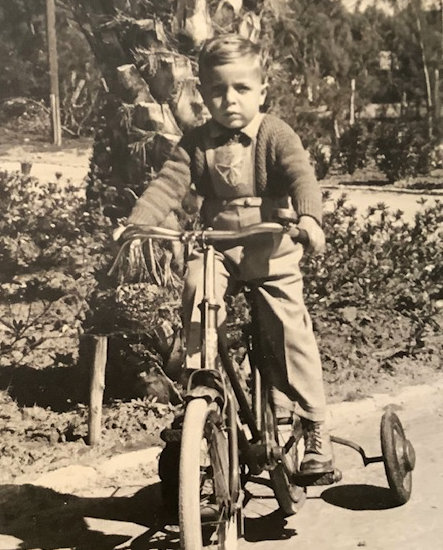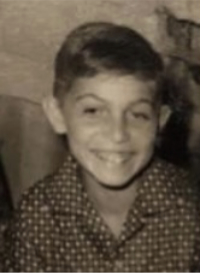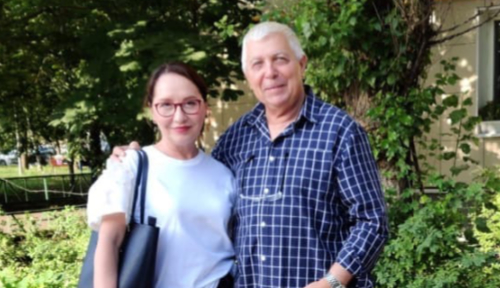Mrs. Ginette Ashkenazy approached DYNAREAD in the late Summer of 2021 with a special request. Would we be willing to develop additional tools in honor of her late son Samuel Bomgard? A unique relationship developed between Mrs. Ashkenazy and DYNAREAD CEO Hans Dekkers, resulting in the world's first online Auditory Test for children with Dyslexia: The Samuel Bomgard SDCA Auditory Test, the subsequent development of the world's first online Mental Chronometric (Mental Processing Speed) Test, and more ongoing collaboration to help children succeed.
The following biographic treatise was submitted by Mrs. Ginette Ashkenazy in honor of her son Samuel Bomgard.
Dyslexia
Dyslexia is one of the most difficult conditions to observe in a child. Deafness is easily perceived by parents, left handedness is self evident, various degrees of autism can be observed by young inexperienced parents, but not so with dyslexia.
The dyslexic child is an active, intelligent, capable, and sometimes funny child. They learn quickly, and masterfully absorb the world around them. The parent does not realise that when they read bedtime stories to their youngster, and the child turns the pages at the appropriate moment, it is not because they are 'reading,'' but because they have memorised the exact moment the parent has turned the page the night before.
It is only when they start going to school that the real problems begin. The child will not, and cannot do homework. They become withdrawn, uncommunicative and difficult. The teachers, if not trained to detect Dyslexia, may deem the child stupid, thick, even retarded. The child is not retarded, the child is dyslexic.
The awareness is there, research has been carried out in many Universities and other scientific entities and help is possible and available (albeit often still very expensive).
My oldest son was dyslexic. He had to find his way in the world without any assistance, since in the 1950's there was none. I lost my son a couple of years ago, in 2020.
Trying to find a way to help other children and parents, I met a wonderful man, Hans Dekkers, who is at the head of Dynaread: An online easily accessible and inexpensive help for dyslexic children. With his assistance we have created a set of services in my son's name. These services are free of charge. They carry my son's name, and the first of these is the Samuel Bomgard SDCA Auditory Test.
Samuel, my first born child, came to this world and mine, on the 15th of March 1952, at the Dajani hospital, in Jaffa, Israel where I had immigrated with my parents a few years earlier, and married my children's father Haim. It did not work out between us, but that came later.
Shmulik, Samuel, was an easy baby, slept most of the time in between feeds and didn't wake us up too often in the nights.
I had awaited this child ever since I was a little girl because I realised very early on, when I was a toddler, in Bulgaria, that love had a price tag on it. I wanted to love and be loved, unconditionally and I thought that only a child of mine could give me the unconditional love I so craved, accepting me as I am, and I would also love and accept him or her unconditionally.
So, my Sam, Shmulik, arrived and I hoped there and then that in three years' time, I would be back at the hospital, in Jaffa, for my second child. I wanted them close in age so they would have interests in common, and be friends. And so it was: My second baby Rudy, was born in 1955, at the same hospital.
Shmulik was a creative child. We were very poor and, in any case, in Israel of the 1950's, there were few toys, which, in any case we could not afford. Shmulik made his own toys. He made interesting objects with bits of carton and string, and played with them. I read nursery books to him and he seemed to follow and turn the pages as I came to the end of a page, having memorised it. Little did I know that he was already developing a photographic memory, because he could not decipher letters and words. A printed page, for him, was a chaotic picture.
My beloved Shmulik at three years old
When the time came for Schmulik to go to school, he was reluctant, unhappy, cried and didn't want to let go of me. When homework became a daily chore, he just didn't do it. Nothing would entice him to sit next to me and do homework, write the symbols to make words with. I didn't know what to do. The teachers began to complain of his 'difficulties,' which I refused to accept. Shmulik was an intelligent, lovely boy. I had never heard of Dyslexia and obviously nor had his teachers. His father, who had high ambitions for him, was cruel and abusive. I did my best to defend my lovely child from his beatings, and saw myself obliged to get him out of the house, to my parents, where he lived for a year, at the age of 8-9. He was dyslexic.
I did not know, nor understood why an intelligent, imaginative, talented, witty child would fail to learn to read. Nobody did. From that time on, Shmulik—instinctively feeling that nobody understood him—closed himself to the outside world, and he created a world of his own, a world of which he could make sense. His teachers treated him as an abnormal child. They even suggested that we send him to a 'Special school,'' shorthand for mentally challenged children.
A lovely 10 years young
When he was very young and happened to witness his father being abusive and cruel to me, he would hug me and say: 'I will look after you, Mum! Don't you worry, I will look after you!' There were a few of those touching, heart warming occasions and I carried in me this feeling of my child, reaching out to me, in my dreams of unconditional devotion.
He left school at age 15 and spent some years learning to polish diamonds. His three dimensional understanding of space and objects enabled him to excel. Then he had to go and do his Army service, which in Israel back then was three years.
During this time, I had moved to London and had established a beauty salon. As my work flourished, I wanted to move into premises, since I had been working from home until then. I was concerned for Shmulik's future. I was far away, and not financially secure. Here in England I could not offer him anything in terms of a job, since his English was not very good, and—at the time—he had no trade. Despite all that, I did ask him to join me in England, but he declined. He was exposed to the Israeli social pressures and his father's constant nagging and denigrating. I knew he was not going to study: I understood he could not. He had not acquired a trade, and after his army service, he was just marking time, and (I feared) getting in with some bad company.
As my work was thriving, I decided to move into premises, got a bank loan and found a shop and basement premises in St. John's Wood, which fitted my requirements. The shop was a large beautiful space but it needed refurbishing.
I knew that calling on Shmulik for assistance was the way to get him out of Israel, and with me in London. He loved helping, and to the end of his life, he referred to his work as 'help.' I called him and told him that I needed his help and he responded immediately.
By then I had met the man who later became my husband and a very good and true friend to Shmulik. Shmulik arrived soon after I called him, and I took him to Boundary Road to show him my future salon. He looked around, smelled out the place and its dimensions and peculiarities, didn't say much, and left. He understood what was necessary, and came back with a whole lot of power tools, wood, screws, and started to work.
Somehow, instinctively, I knew not to ask him what he was doing. He knew that one needs cubicles in a alon, that the floor needed covering, a reception area was to be installed, and so forth. He did it all by himself in a few weeks. He was 23 years old, had never done anything like this in his life and was not even surprised at what he had done. He could not read instructions, he looked, and understood, and worked it out.
We had a nice opening celebration. I invited my existing clients, and the coffee shop across the street provided catering. A friend provided Poetry readings, and Shmulik's clever installation at the reception desk provided music. That installation, at the reception desk, consisted of a music box and a secret compartment to put cash in, if I or Josh, my husband who sat at reception, needed to leave for some reason.
My clients were very impressed with the Salon. They complimented me on the clever and harmonious design and almost all asked me for the name of the architect who had designed it.
This was the beginning of Shmuliks long and successful career as an interior designer, home refurbishments specialist, and a lot more. A few years later, one of his clients, very happy with the work Shmulik had done for him, gave him a gift. A computer.
By then Shmulik had workers, most of them Polish, and he learned their language because they did not speak English!
Shmulik always loved challenges, and the computer was a true enigma. He spent all his free time trying to understand it, and understand it he did. He found an application, called CAD. It was a designer's dream and he spent months studying how it worked. For years afterwards, he did all his designs on his computer, which eventually got connected to a large screen on the wall, and he did everything from the comfort of his armchair and a remote keyboard. He found out that the computer could read to him, so all his correspondence was read out by his computer and it all worked out for him.
hmulik found it difficult to admit outside presence in his life. It was very hard to get close to him. He defended himself against the wrong judgments he had received from almost everybody. He could not explain himself away.
He couldn't stand incompetence in his work. He had perfected his knowledge and understanding of everything connected with his profession and did not tolerate mediocrity. But when you got close to him, you discovered a warm, loving, generous, witty and charming, 'honest to a fault' man.
Now we fast forward to 2016: Four years before his untimely death. My husband, Josh, fell ill. He was diagnosed with Pulmonary Fibrosis: a cruel incurable disease. Very quickly we needed oxygen tanks at home, we needed weekly blood tests and visits to the hospital, special diet, many, many tablets per day, each to be taken at a specified time. I was on my feet for long hours, tired, worried and—most of the time—knowing that my husband was dying. Shmulik understood what was happening and he was there every day. Taking on a lot of the tasks with Josh, who soon needed a wheelchair, trying to allow me some free time. My second son, Rudy came over from Israel where he lives with his family. He too helped to give both me and Shmulik a break. Josh didn't want any outside help. He refused to have a social helper to come, he only wanted me, and I was there. Social Services offered me Care Counselling. Once a week—while somebody acceptable to Josh could stay with him (Shmulik mainly)—I went and had sessions with a wonderful , understanding and warmhearted young woman, who gently guided me through the maze of caring for a dying man.
Then, one day, on my way back from such a session, I tripped and fell. I broke a few bones in my foot and shuttered my shoulder. I will skip the details of my injuries, because this is not what I am writing about. I am writing about my boy, who hugged me when he was only a child, and told me: I will look after you, Mum.
He did. After Josh died, I slowly began taking care of my injuries and Shmulik was there all the way. Specialists, X-rays, MRIs , taking results to and from laboratories, driving me to and from physio treatments, preparing food in his flat and bringing it over for me to have something good and healthy to eat. He did it all with gusto.
Initially, feeling guilty of requiring so much of his time, I wanted to stop him. I thought it better to find someone to help me, since I was unable to stand on my feet. But he insisted and, somehow, I felt he was taking my attitude as a rejection and I understood. His totally natural altruism, his desire to help was actually a need. He needed to help me. In my heart it felt right, and I accepted his help, which to him, meant accepting him.
Those next two years he was happy, smiling, amusing and....looking after me. My Rough Diamond had become a shiny, polished, easy going, happy Bright Diamond!
Of course, Rudy came over, intermittently, to take over for a while, like when I had my metatarsus operation, etc.
Half way through the first year of my long recovery, Shmulik met Sima. She was a lovely young woman who loved him totally, completely and unreservedly, the way he loved her. I saw my boy flourish, happy, smiling and laughing. Sima had understood and accepted him as he was.
'Get better quickly now,'' He told me, 'I want to go to Sima, she is my life and my future. I will not be alone, Mum, I have Sima.'
Samuel & Sima
Shmulik had an aversion to doctors, illness, medical tests, anything that interfered with his notion of himself as a unit. A complete untouchable self. But he did know. He knew that he was not taking care of himself properly. Only a few weeks before he died, he told me: 'Ima, I eat healthy all day long, but come the evening , I just eat a lot of rubbish.'
'My Shmulik died in his armchair, struck by a massive heart attack. From the evidence, he did not even have time to seek his telephone to get help. He was 68 years old.
For me, life without him is very hard. My life feels like a heavy rock that, from here on in, I shall have to push, push up some mountain. I will mourn him for as long as it lasts.
Shmulik taught me something. He only shone when I allowed him to give me what he wanted to give me, which to him meant that he was accepted. Acknowledged.
Now I consciously accept people as they are, without criticising them or reproaching them for what they are not. Shmulik taught me that, in a much deeper way. Taking from him what he both wanted and could give me, was accepting him as he was, and that means Love.
Thinking of my second born child Rudy, and of his sons whom I love totally, makes me accept to carry on. Otherwise, there is no sense.
Goodbye my very treasured diamond.
Ginette Ashkenazy
Introducing Daisy
The first operational user of the Samuel Bomgard SDCA Auditory Test
Daisy, our very first user of the Samuel Bomgard SDCA Auditory Test, allowed me to use her photo (after we requested permission, of course). I told her Mom that Daisy was our first operational user. This is what Amber, her Mom, wrote back on Wed, 23 Mar 2022...
Hello dear Ginette,
Wow, our Daisy the very first user, and with her picture on Dynaread! When I asked Daisy if she was OK with Dynaread using her picture she was very excited. Daisy has leaned over to me lately a couple of times, whispering: 'My name will be in history!' ❤️
Daisy
DYNAREAD: Helping children succed... One at a time. It takes a village to raise a child. We will always be grateful for Ginette and her enabling gift in honor of her son Samuel.

![]() Our Dynaread team members are required to hold themselves accountable for serving our clients in adherence with our core values...
Our Dynaread team members are required to hold themselves accountable for serving our clients in adherence with our core values...
Contribute with scientific and overall integrity.
Retain the focus on the needs of each individual child.